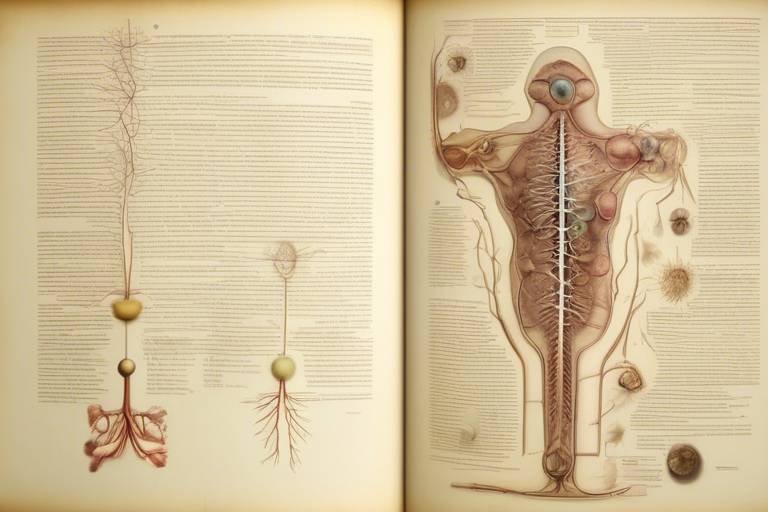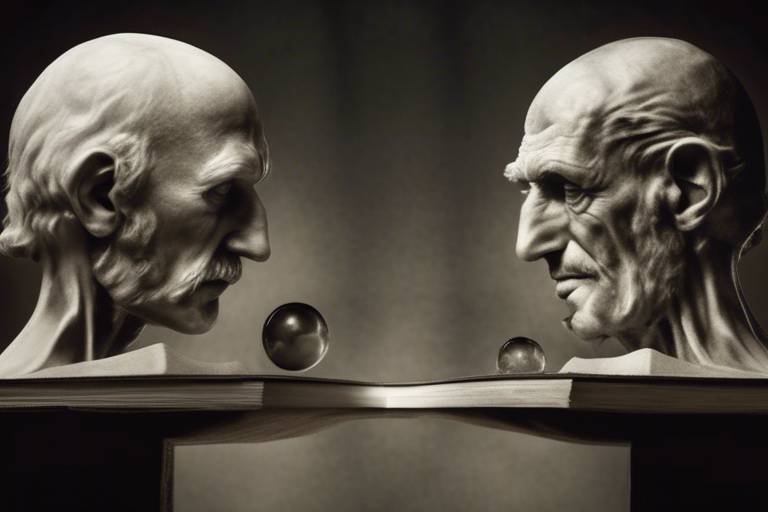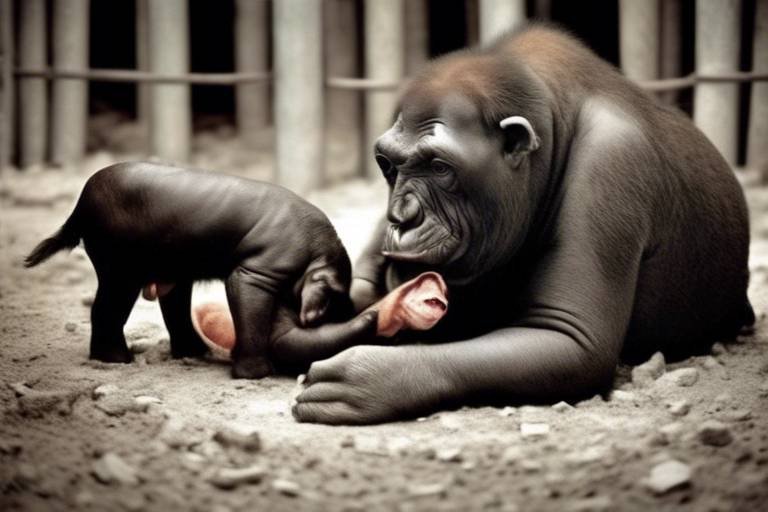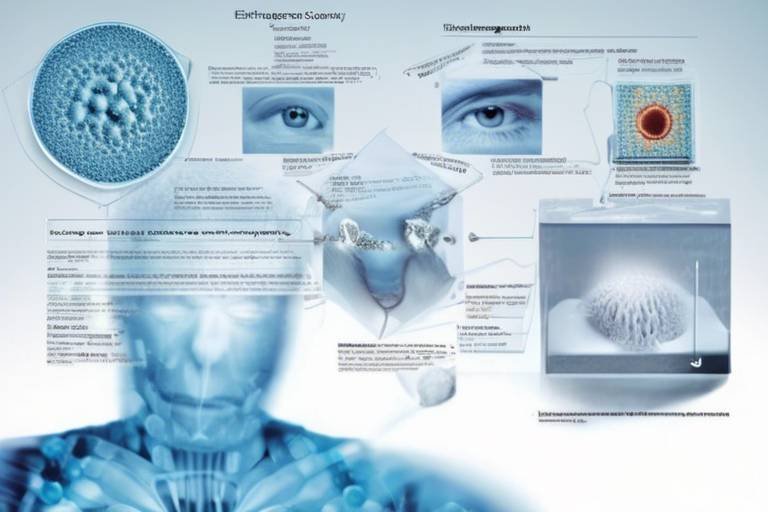Teleology in Biology - Science or Philosophy?
When we dive into the fascinating world of biology, we often encounter the concept of teleology, which raises intriguing questions about the nature of life itself. Is there a purpose behind the intricate designs of living organisms, or are they merely the products of random processes? This debate has been a cornerstone of both scientific inquiry and philosophical reflection for centuries. In this article, we will explore the implications of teleology in biology, examining whether it belongs to the realm of science or philosophy. By understanding teleology, we can better grasp how it influences our perceptions of life, evolution, and the very essence of existence.
To grasp the concept of teleology, we must first understand its roots. The term originates from the Greek word "telos," meaning purpose or goal. Teleology refers to the explanation of phenomena based on the purpose they serve rather than their immediate causes. In biology, this means looking at how various structures and functions of organisms contribute to their survival and reproduction. For example, the long neck of a giraffe can be seen as a teleological adaptation that allows it to reach high leaves, serving a clear purpose in its ecological niche.
In a philosophical context, teleology invites us to ponder deeper questions about existence. Why do living organisms exhibit such complexity? Is there an underlying intention behind their development? These questions bridge the gap between science and philosophy, prompting us to consider not just how life operates, but why it exists in the first place.
Throughout history, teleological thinking has undergone significant evolution. Ancient philosophers like Aristotle championed the idea that nature is directed towards specific ends. He believed that every organism has a purpose that contributes to the greater order of the universe. This Aristotelian teleology laid the groundwork for later scientific thought, influencing how we interpret biological functions even today.
Aristotle's perspective on teleology emphasized the importance of purpose in understanding natural phenomena. He proposed that every biological function, from the structure of a leaf to the behavior of animals, serves a specific role in the ecosystem. For instance, he viewed the heart as the central organ of life, with its purpose being to circulate blood and sustain life. This teleological approach helped shape early scientific methodologies, as it encouraged researchers to seek out the functions and purposes behind various biological traits.
Despite its profound influence, Aristotelian teleology faced significant criticism, especially during the rise of modern science. Critics argued that attributing purpose to biological functions was unscientific and that it oversimplified the complexity of natural processes. The mechanistic view of biology emerged, suggesting that life could be understood through the lens of physical and chemical interactions rather than inherent purposes. This shift paved the way for a more empirical approach to biology, focusing on observation and experimentation rather than philosophical speculation.
In contemporary biology, teleological concepts have been reinterpreted in light of evolutionary theory. Scientists now grapple with the challenge of reconciling purpose with the principles of natural selection. While evolutionary processes can produce adaptations that serve specific functions, the question remains: do these adaptations imply a predetermined purpose, or are they simply the result of random variations that proved advantageous over time? This ongoing debate shapes our understanding of biological phenomena and pushes the boundaries of both science and philosophy.
The contrast between teleological explanations and mechanistic approaches highlights a fundamental tension in biology. Teleological explanations focus on the why—the purpose behind traits and behaviors—while mechanistic approaches emphasize the how—the underlying processes that drive biological functions. This dichotomy influences research methodologies, interpretation of data, and ultimately, our understanding of living systems. As researchers navigate this complex landscape, they must decide whether to adopt a teleological lens or embrace a more mechanistic perspective, each with its own implications for the study of life.
When we examine teleology within the framework of evolutionary biology, we encounter a rich tapestry of ideas. The role of teleology in evolutionary theory raises questions about whether natural selection aligns with teleological perspectives or fundamentally opposes them. Does the existence of adaptive traits imply a purpose in evolution, or are they simply byproducts of random processes? These questions are not just academic; they impact how we perceive the very nature of life and its evolution.
Adaptive traits are often seen as evidence of purpose in evolution. For instance, the camouflage of a chameleon serves a clear function in its survival. However, this leads us to ponder: do these traits arise from a deliberate design, or are they the result of countless generations of random mutations that happened to be advantageous? Understanding this complexity can help us appreciate the intricate dance between chance and necessity in the evolutionary process.
The philosophical ramifications of teleology in biology are profound. Teleological thinking influences ethical considerations, shaping our understanding of life, existence, and our responsibilities toward other living beings. If we view life through a teleological lens, we may feel a greater obligation to protect ecosystems and species, recognizing their interdependent roles in the grand tapestry of life. This perspective invites us to reflect on our place in the natural world and challenges us to consider the ethical implications of our actions.
- What is teleology in biology? Teleology in biology refers to the explanation of biological phenomena based on the purpose they serve, rather than merely their causes.
- How has teleological thinking evolved? Teleological thinking has evolved from ancient philosophical roots, particularly in Aristotelian thought, to modern interpretations that grapple with the principles of evolution.
- What is the difference between teleology and mechanism? Teleology focuses on the purpose behind biological traits, while mechanism emphasizes the processes that drive these traits.
- Does natural selection imply purpose? The relationship between natural selection and purpose is complex; adaptive traits may suggest purpose, but they can also arise from random processes.

Understanding Teleology
Teleology is a fascinating concept that delves into the purpose behind various phenomena. At its core, it seeks to answer the question: Why does this exist? Originating from the Greek word "telos," meaning "end" or "purpose," teleology has been a significant part of both philosophical and scientific discussions. It provides a framework for understanding not just biological functions but also broader existential inquiries. In biology, teleology often manifests in the study of how certain traits or behaviors serve specific functions that contribute to the survival and reproduction of organisms. This perspective can sometimes feel like peering through a lens that reveals the intricate design of life itself, where every organism seems to have a role to play in the grand tapestry of nature.
Historically, teleological explanations were prominent in the works of ancient philosophers such as Aristotle, who posited that everything in nature has a purpose. He believed that understanding the purpose behind biological traits was vital for grasping their significance. For example, he might argue that the wings of a bird exist not merely as a physical structure but because they serve the purpose of flight, which in turn aids in survival. This perspective invites a sense of wonder, suggesting that nature is not just a random collection of forms but a system imbued with meaning.
However, as science progressed, particularly with the advent of the mechanistic worldview during the Enlightenment, teleological explanations began to face scrutiny. Many scientists started to favor explanations based on physical laws and random chance rather than purpose. This shift led to a more reductionist approach, where biological functions were seen as results of complex interactions rather than purposeful designs. Yet, the debate did not end there; even in modern biology, the question of purpose continues to intrigue researchers and philosophers alike.
To further illustrate the significance of teleology, consider the following key points:
- Purpose in Nature: Teleology emphasizes that natural phenomena can often be understood through their functions and purposes.
- Philosophical Roots: The concept has deep philosophical roots, prompting discussions about existence and the nature of life.
- Scientific Implications: Understanding teleology can influence scientific methodologies and interpretations of biological data.
In conclusion, teleology serves as a bridge between science and philosophy, inviting us to ponder not only how life operates but also why it exists in the form that it does. As we continue to explore the depths of biology, the implications of teleological thinking will undoubtedly remain a vital part of our inquiries. It challenges us to look beyond mere mechanisms and consider the broader significance of life itself.

Historical Perspectives on Teleology
Teleology, the study of purpose in nature, has a rich and complex history that stretches back to ancient civilizations. It is fascinating to see how this concept has evolved, reflecting the changing attitudes toward nature, science, and philosophy. In ancient Greece, philosophers like Aristotle were pivotal in shaping the early understanding of teleology. Aristotle posited that everything in nature has a purpose, a final cause that drives its existence and function. He believed that the natural world is not merely a collection of random events but is instead organized towards specific ends. This perspective laid the groundwork for much of Western thought and influenced countless scholars throughout history.
As we journey through history, we encounter a tapestry of thinkers who have contributed to the teleological debate. The Middle Ages saw a fusion of Aristotelian thought with religious doctrine, where teleology was often interpreted through a theological lens. Scholars like Thomas Aquinas integrated Aristotelian principles with Christian theology, arguing that the existence of purpose in nature aligned with the divine plan. This period emphasized that understanding nature's purpose was essential for understanding God's creation.
However, the Renaissance and the subsequent Scientific Revolution marked a significant shift in the perception of teleology. As scientists began to rely more on observation and experimentation, the mechanistic worldview took hold. Thinkers such as Galileo and Newton focused on the laws of nature, often sidelining the concept of purpose. This mechanistic approach led to a more reductionist view of biology, where organisms were seen as complex machines operating under physical laws rather than entities with inherent purposes.
Despite this shift, the 19th century brought about a resurgence of interest in teleological explanations, particularly with the advent of Darwin's theory of evolution. While Darwin himself did not advocate for a teleological view of evolution, the notion of adaptive traits suggested a kind of purpose in the way organisms evolved to fit their environments. This sparked debates about whether natural selection could be seen as a teleological process or if it was purely a series of random mutations and environmental pressures.
In modern times, the discussion surrounding teleology has continued to evolve. Contemporary biologists and philosophers are now grappling with how to reconcile the mechanistic view of biology with the intuitive sense of purpose that many people feel exists in nature. Some argue that while evolutionary processes may not be teleological in the traditional sense, they can still lead to outcomes that appear purposeful. This ongoing dialogue reflects the complexity of life and our attempts to understand it.
To summarize, the historical perspectives on teleology reveal a dynamic interplay between science and philosophy. From Aristotle's purposeful nature to the mechanistic views of the Scientific Revolution, and the modern interpretations influenced by evolutionary theory, the concept of teleology has undergone significant transformations. Each stage of this evolution has contributed to our understanding of biology and the philosophical implications of purpose in nature.
- What is teleology? Teleology is the study of purpose in nature, explaining phenomena by the ends they serve.
- Who is a key figure in the history of teleology? Aristotle is a pivotal figure who emphasized the importance of purpose in natural phenomena.
- How did the Scientific Revolution affect teleological thinking? The Scientific Revolution shifted focus towards mechanistic explanations, often sidelining the concept of purpose.
- Does modern biology incorporate teleological concepts? Yes, modern biology explores how purpose can be reconciled with evolutionary processes.

Aristotelian Teleology
When we dive into the world of , we uncover a fascinating perspective that views nature as inherently purposeful. Aristotle, the ancient Greek philosopher, was not just a thinker; he was a pioneer in understanding the underlying reasons for the existence of things. He proposed that everything in nature has a specific purpose or end goal, which he termed telos. This idea was revolutionary, as it suggested that biological functions are not random but rather directed towards achieving specific outcomes.
Aristotle categorized living beings into different forms, each with a unique function. For instance, he believed that the purpose of an acorn is to grow into an oak tree, indicating that every stage of its development serves a greater purpose. This perspective laid the groundwork for future biological studies, emphasizing that understanding an organism's purpose can lead to a deeper comprehension of its structure and behavior. In essence, Aristotle's teleology provided a framework for examining the natural world, where every element has a role to play in the grand scheme of life.
However, Aristotle's ideas were not without their challenges. Critics pointed out that attributing purpose to every biological function could lead to an oversimplification of complex processes. Despite this, his influence persisted, shaping the thoughts of many scholars throughout history. To illustrate how Aristotelian teleology has impacted scientific thought, consider the following table:
| Aspect | Aristotelian View | Modern Perspective |
|---|---|---|
| Purpose of Organisms | Each organism has a specific purpose or end goal. | Purpose is often seen as a byproduct of evolutionary processes. |
| Biological Functions | Functions are directed towards achieving an end. | Functions may arise from random mutations and natural selection. |
| Understanding Nature | Nature is inherently purposeful. | Nature is often viewed as mechanistic and indifferent. |
In the context of biology, Aristotelian teleology encourages us to ask profound questions about the nature of life. For example, when studying an animal's behavior, one might wonder: What is its purpose? What role does it play in its ecosystem? These questions drive scientific inquiry and foster a deeper appreciation for the interconnectedness of life. However, as we advance in our understanding of biology, we must navigate the delicate balance between recognizing purpose and acknowledging the randomness inherent in evolutionary processes.
Ultimately, Aristotelian teleology provides a rich philosophical backdrop against which modern biology can be viewed. It challenges us to consider not just how organisms function, but why they exist in the first place. As we continue to explore the mysteries of life, Aristotle's insights remind us that the quest for understanding is as much about purpose as it is about mechanics.
- What is Aristotelian teleology?
It is the philosophical concept that everything in nature has a purpose or end goal. - How did Aristotle influence biology?
He emphasized the importance of understanding the purpose of biological functions, shaping future scientific thought. - What are critiques of Aristotelian teleology?
Critics argue that it oversimplifies complex biological processes by attributing purpose to every function. - How does modern biology view teleology?
Modern biology often sees purpose as a byproduct of evolutionary processes rather than an inherent quality.

Critiques of Aristotelian Thought
While Aristotle's contributions to teleology laid significant groundwork for understanding biological functions, his views have not gone unchallenged. Critics argue that his emphasis on purpose in nature can lead to a misunderstanding of biological processes. For instance, the idea that every structure or behavior in an organism must serve a specific function can be overly simplistic. This perspective tends to ignore the complexity and randomness inherent in evolutionary processes.
One major critique stems from the rise of mechanistic biology in the 17th century. Thinkers like René Descartes and later Charles Darwin introduced frameworks that focused on observable mechanisms rather than purposes. They posited that biological traits arose through natural selection, a process driven by random mutations rather than intentional design. This shift towards a more empirical approach challenged the Aristotelian view by suggesting that not all biological phenomena need a purpose.
Furthermore, critics highlight that Aristotelian teleology can lead to anthropocentric biases. By attributing human-like purposes to nature, we risk projecting our own values and intentions onto biological systems. This can skew our understanding of nature, as it may cause us to overlook the true mechanisms at play in evolution and adaptation.
In contemporary discussions, the mechanistic view has gained traction, particularly with the advent of genetics and molecular biology. Scientists now often describe biological processes in terms of biochemical pathways and evolutionary pressures, rather than purposes. This has led to a more nuanced understanding of life that accommodates randomness and complexity, moving away from the simplistic notions of purpose that Aristotelian thought might suggest.
In summary, while Aristotelian teleology provided a foundational perspective on biological functions, critiques have illuminated its limitations. The mechanistic approach, rooted in empirical observation and scientific inquiry, has emerged as a more robust framework for understanding the complexities of life. In the end, the debate between teleology and mechanism continues to shape our understanding of biology, urging us to consider both perspectives in our quest for knowledge.
- What is Aristotelian teleology? Aristotelian teleology refers to the idea that natural phenomena can be explained by their purpose or function, as proposed by the philosopher Aristotle.
- How did mechanistic biology challenge Aristotelian thought? Mechanistic biology introduced a focus on observable processes and random mutations, suggesting that not all biological traits need a specific purpose, contrasting with Aristotle's views.
- What are the implications of teleological thinking in modern biology? Teleological thinking can lead to anthropocentric biases and oversimplification of biological processes, while modern biology often emphasizes randomness and complexity.
- Is teleology still relevant in scientific discussions today? Yes, while mechanistic explanations dominate, discussions about teleology still arise, particularly in philosophical and ethical contexts related to biology and evolution.

Modern Interpretations
In the landscape of contemporary biology, the concept of teleology has undergone a fascinating transformation. No longer confined to the rigid frameworks of ancient philosophy, modern interpretations embrace a more nuanced understanding that intertwines purpose with scientific rigor. Today, scientists grapple with the idea that biological systems may exhibit purpose-driven characteristics, yet they do so within the context of evolutionary theory. This duality raises intriguing questions: Can we reconcile the apparent design in nature with the randomness of evolutionary processes? Or are these two perspectives fundamentally at odds?
One of the key advancements in modern biology is the recognition that teleological explanations can coexist with mechanistic views. For instance, the concept of adaptive traits is often cited as a prime example where teleology makes a compelling case. These traits, which enhance an organism's survival and reproduction, might suggest a purpose behind their existence. However, the question remains: do these traits arise from a predetermined plan, or are they simply the byproduct of natural selection acting on random mutations? This debate is not merely academic; it influences how we understand the very fabric of life.
Moreover, modern interpretations challenge us to rethink the implications of teleology in various biological contexts. For example, consider the field of ecology. Here, the interactions between organisms and their environments often seem to reflect a purposeful balance, where each species plays a role in maintaining ecological harmony. This perception of purpose prompts scientists to explore questions such as:
- Does the role of a predator in an ecosystem imply a teleological function?
- How do symbiotic relationships illustrate purpose in nature?
- Can we find a teleological explanation for biodiversity?
As we delve deeper into the molecular level, the concept of teleology becomes even more intriguing. The intricate mechanisms of cellular processes, such as signaling pathways and gene regulation, often exhibit characteristics that suggest a goal-oriented function. For instance, the way cells respond to environmental stimuli can be seen as a purposeful adaptation to ensure survival. This perspective invites a broader philosophical inquiry: if life at the cellular level operates with purpose, what does that say about the nature of existence itself?
In summary, modern interpretations of teleology in biology are not about choosing sides but rather about embracing a rich tapestry of understanding. By integrating teleological perspectives with mechanistic explanations, scientists are paving the way for a more holistic view of life. This approach not only enhances our comprehension of biological phenomena but also encourages a deeper appreciation for the complexity and interconnectedness of living systems.
What is teleology in biology?
Teleology in biology refers to the explanation of biological phenomena by their purposes or functions, suggesting that certain traits or behaviors exist for a specific reason.
How does teleology differ from mechanism?
Teleology focuses on the purpose behind biological traits, while mechanism emphasizes the processes and interactions that lead to those traits without attributing any inherent purpose.
Can teleology coexist with evolutionary theory?
Yes, many modern scientists believe that teleological explanations can coexist with evolutionary theory, as adaptive traits may appear purposeful while still arising from natural selection.
What are adaptive traits?
Adaptive traits are characteristics that enhance an organism's ability to survive and reproduce in its environment, often viewed as evidence of purpose in evolution.

Teleology vs. Mechanism
When diving into the world of biology, one can't help but encounter the intriguing debate between teleology and mechanism. At its core, teleology is all about purpose—it's like looking at a beautiful clock and wondering what each gear is meant to achieve. On the other hand, mechanism presents a more technical view, focusing on the intricate workings of those gears without necessarily attributing any purpose to them. This dichotomy raises fascinating questions: Can we truly understand living systems without considering their purposes, or does the mechanism alone suffice in explaining the wonders of life?
The teleological perspective argues that biological processes serve specific ends; for instance, the heart pumps blood to sustain life, and leaves on a tree capture sunlight to facilitate photosynthesis. In contrast, the mechanistic viewpoint breaks down these processes into their constituent parts, emphasizing how each component functions within a larger system. Imagine a car engine: while a teleologist might argue that the engine exists to propel the car forward, a mechanist would focus on how each part—like the pistons, crankshaft, and fuel injectors—works together to achieve that motion.
This fundamental disagreement influences not only scientific research but also the interpretation of findings. For example, when studying an organism's adaptation to its environment, a teleologist might emphasize how these adaptations serve a purpose, such as enhancing survival. Conversely, a mechanist would highlight how these adaptations arise through random mutations and natural selection, without any inherent purpose guiding the process.
To further illustrate this contrast, consider the table below, which summarizes key differences between teleological and mechanistic approaches:
| Aspect | Teleology | Mechanism |
|---|---|---|
| Focus | Purpose and function | Components and processes |
| Explanation | Why something exists | How something works |
| Example | The eye exists for vision | The eye functions through light refraction |
As we navigate this debate, it’s essential to recognize that both perspectives can coexist. Many contemporary scientists argue that while mechanisms are crucial for understanding the how of biological processes, teleological considerations can enrich our understanding of the why. This dual approach can lead to a more holistic view of life, where the intricate mechanisms of biology are appreciated alongside their evolutionary purposes.
In conclusion, the tension between teleology and mechanism is not just an academic exercise; it reflects our broader quest to understand life itself. Whether we lean towards one perspective or the other, it's clear that both have valuable insights to offer. So, the next time you marvel at the complexity of living organisms, consider asking yourself: Are we simply observing a machine, or are we witnessing a purpose-driven design?

Teleology in Evolutionary Biology
When we dive into the fascinating world of evolutionary biology, the concept of teleology often stirs up quite a debate. At its core, teleology suggests that biological processes are directed towards an end goal or purpose. But how does this fit into the framework of evolution, which is often perceived as a series of random mutations and natural selection? This is where things get intriguing. Some might argue that natural selection inherently implies a kind of purpose, as organisms adapt to their environments in ways that seem purposeful. However, others assert that this interpretation can be misleading. Are these adaptations truly indicative of a directed purpose, or are they simply the result of chance and survival?
To better understand this, we can consider the concept of adaptive traits. These traits are characteristics that have evolved in a way that enhances an organism's chances of survival and reproduction in a given environment. For example, the long neck of a giraffe is often cited as a teleological feature, allowing it to reach high leaves that other animals cannot. But does this mean the giraffe's neck evolved with a specific purpose in mind? Or was it merely a result of random genetic variations that happened to confer an advantage? This question of purpose versus randomness is central to the ongoing discussion about teleology in evolutionary biology.
One way to illustrate this is through a simple
| Aspect | Teleological View | Mechanistic View |
|---|---|---|
| Evolutionary Process | Directed towards specific goals | Random mutations and natural selection |
| Adaptation | Implying purpose in traits | Traits arise from environmental pressures |
| Understanding of Life | Life has inherent goals | Life is a product of chance |
As we explore these contrasting views, it's essential to recognize the philosophical implications that arise from teleological thinking in evolutionary biology. If we accept that there is a purpose in evolution, we might begin to ponder deeper questions about our own existence. What does it mean for us as humans to be a product of evolution? Are we simply the result of random processes, or do we have a role to play in a larger narrative? These questions can lead to a rich tapestry of ethical considerations, influencing how we view our responsibilities towards nature and each other.
In conclusion, the intersection of teleology and evolutionary biology is a complex and often contentious area of study. While teleological perspectives can provide a compelling framework for understanding the purpose behind biological adaptations, they must be balanced with the mechanistic explanations that emphasize randomness and chance. Ultimately, the ongoing dialogue between these two viewpoints enriches our understanding of life itself, prompting us to reflect on our place in the grand evolutionary story.
- What is teleology in biology? Teleology in biology refers to the explanation of biological phenomena by the purposes they serve, suggesting that certain traits or behaviors have evolved for specific functions.
- How does teleology relate to evolution? Teleology raises questions about whether evolutionary processes are directed towards specific goals or if they are the result of random mutations and natural selection.
- Can adaptations be seen as purposeful? While some adaptations may appear purposeful, they can also be understood as random variations that provided advantages in survival and reproduction.
- What are the implications of teleological thinking? Teleological thinking can influence ethical considerations and our understanding of life's meaning, prompting deeper reflections on our responsibilities towards the environment and each other.

Adaptive Traits and Purpose
When we delve into the concept of adaptive traits, we often find ourselves pondering a fundamental question: do these traits imply a specific purpose in evolution, or are they merely the products of random processes? This question is not just a matter of academic curiosity; it touches on the very essence of how we understand life itself. Adaptive traits are characteristics that enhance an organism's ability to survive and reproduce in a particular environment. Think of a giraffe's long neck, which allows it to reach high leaves in trees. Is the giraffe's long neck a result of a purposeful design, or is it simply a fortunate outcome of evolutionary pressures over time?
To grasp this concept more clearly, consider the following points:
- Natural Selection: This process acts as a filter, favoring traits that confer advantages in survival. But does this mean that nature is "aiming" for a specific outcome? Not necessarily.
- Random Mutations: Traits often arise from random genetic mutations. While some mutations may lead to advantageous adaptations, others can be neutral or even harmful.
- Environmental Influence: The environment plays a crucial role in shaping which traits are advantageous. As conditions change, the traits that are favored can also shift, suggesting a dynamic process rather than a fixed purpose.
In the context of evolutionary biology, adaptive traits can be seen as responses to environmental challenges rather than indicators of an inherent purpose. For example, consider the peppered moth, which evolved darker coloration during the Industrial Revolution as a survival mechanism against predation. This adaptation was not a conscious choice by the moths but rather a result of the selective pressures imposed by their environment. The darker moths survived better in polluted areas, leading to a shift in the population's coloration over time.
This brings us to the crux of the debate: whether the existence of adaptive traits suggests an underlying purpose in evolution. Some argue that the very nature of adaptation implies a directionality, as organisms seem to be "moving towards" traits that enhance their survival. Others counter that this perspective risks anthropomorphizing natural processes, attributing human-like intentions to biological evolution. They argue that evolution is inherently non-teleological—meaning it does not have a predetermined end goal.
Ultimately, understanding adaptive traits requires a nuanced perspective that balances both evolutionary mechanisms and philosophical implications. While adaptive traits enhance survival, the mechanisms through which they arise are often complex and multifaceted. This leads us to an important realization: the interplay between chance and necessity in evolution is intricate, and while we may perceive purpose in the adaptations of organisms, it's essential to remember that evolution operates without foresight or intention.
- What are adaptive traits? Adaptive traits are characteristics that improve an organism's chances of survival and reproduction in a specific environment.
- Do adaptive traits imply purpose in evolution? While adaptive traits may suggest a directionality, they arise from natural selection and random mutations, not from an inherent purpose.
- How do environmental factors influence adaptive traits? The environment determines which traits are advantageous, leading to changes in populations over time.
- Can adaptive traits change over time? Yes, as environmental conditions shift, the traits that are favored can also change, demonstrating the dynamic nature of evolution.

Philosophical Implications
When we dive into the philosophical implications of teleology in biology, we're not just scratching the surface; we're uncovering a treasure trove of questions that challenge our understanding of life itself. Teleology, with its focus on purpose, compels us to ponder: What does it mean for something to have a purpose? Is there a grand design behind the complexity we observe in living organisms, or is it merely a product of chance and natural selection? These questions lead us down a rabbit hole of ethical considerations, existential musings, and even debates about the very nature of reality.
One of the most intriguing aspects of teleological thinking is how it influences our ethical frameworks. If we believe that organisms have inherent purposes, this can shape our views on conservation, animal rights, and even biotechnology. For instance, if we view certain species as having a specific role in their ecosystems, we might advocate more vigorously for their protection. Conversely, a mechanistic view, which sees life as a series of random events, might lead to a more utilitarian approach, where the value of life is measured solely by its utility to humans.
Furthermore, teleology invites us to reflect on our own existence. Are we simply the product of evolutionary processes, or do we have a purpose that transcends biological imperatives? This question can be both liberating and daunting. It opens up discussions about spirituality, morality, and our place in the universe. As we navigate through life, the belief in a purposeful existence can provide comfort and direction, while a lack of perceived purpose might lead to existential angst.
To illustrate these philosophical implications further, consider the following table that summarizes key contrasts between teleological and mechanistic perspectives:
| Aspect | Teleological Perspective | Mechanistic Perspective |
|---|---|---|
| Purpose | Inherent purpose in organisms | No inherent purpose; random processes |
| Ethics | Value based on roles in ecosystems | Value based on utility to humans |
| Existence | Potential for transcendent meaning | Meaning derived from individual experience |
As we explore these implications, we must also consider how teleological thinking can impact scientific inquiry. Does the search for purpose in biological systems enhance our understanding, or does it cloud our judgment with biases? This is a critical question for scientists and philosophers alike, as it shapes the methodologies we employ in research and the interpretations we draw from our findings.
In conclusion, the philosophical implications of teleology in biology extend far beyond academic discourse. They touch on fundamental questions about our existence, ethical responsibilities, and the very nature of life. As we continue to grapple with these concepts, one thing remains clear: the interplay between science and philosophy is not just a theoretical exercise; it is a vital part of understanding the world around us.
- What is teleology? Teleology is the explanation of phenomena by the purpose they serve, rather than by postulated causes.
- How does teleology relate to biology? In biology, teleological explanations focus on the roles and purposes of biological functions and structures.
- What are the criticisms of teleological thinking? Critics argue that teleology can lead to anthropocentrism and may obscure the randomness inherent in evolutionary processes.
- Can teleology coexist with evolutionary theory? Yes, some modern interpretations suggest that teleological concepts can be reconciled with evolutionary mechanisms, focusing on adaptive traits.
Frequently Asked Questions
- What is teleology in biology?
Teleology in biology refers to the explanation of biological phenomena by the purposes they serve. It considers the functions and goals of living organisms, suggesting that certain traits or behaviors exist for specific reasons, rather than purely as a result of random processes.
- How does teleology differ from mechanistic explanations?
While teleology focuses on the purpose behind biological processes, mechanistic explanations emphasize the physical and chemical interactions that lead to those processes. In other words, teleology asks "why" something exists, while mechanism explains "how" it works.
- Is teleology a scientific concept or a philosophical one?
Teleology straddles both science and philosophy. While it has roots in philosophical inquiry, its implications can significantly influence scientific understanding, particularly in areas like evolutionary biology. The debate continues on whether it should be considered a legitimate scientific framework or a philosophical perspective.
- What are some historical perspectives on teleology?
Historically, teleological thinking can be traced back to ancient philosophers like Aristotle, who emphasized purpose in nature. Over time, critiques of this view emerged, leading to more mechanistic approaches in biology. Understanding these historical shifts helps contextualize current debates on the role of purpose in biological processes.
- How does teleology relate to evolutionary biology?
In evolutionary biology, teleology raises questions about whether natural selection is a teleological process or if it operates independently of purpose. Some argue that adaptive traits imply a purpose in evolution, while others contend that they arise purely from random mutations and environmental pressures.
- What are the philosophical implications of teleology in biology?
The philosophical implications of teleology in biology are profound, influencing ethical considerations and our understanding of life and existence. It prompts questions about the meaning of life, the purpose of species, and how we view our responsibilities towards other living beings.
- Can teleological thinking coexist with modern scientific methods?
Yes, teleological thinking can coexist with modern scientific methods, but it requires careful integration. Many contemporary scientists seek to reconcile purpose with evolutionary theory, acknowledging that while mechanisms explain how life operates, the concept of purpose can still provide valuable insights into biological functions.



















